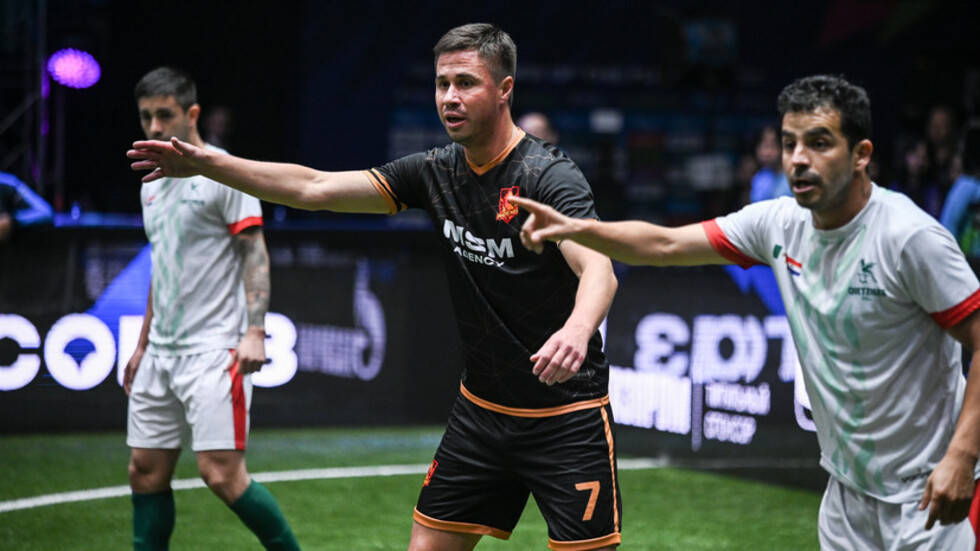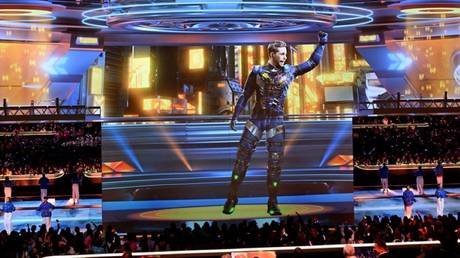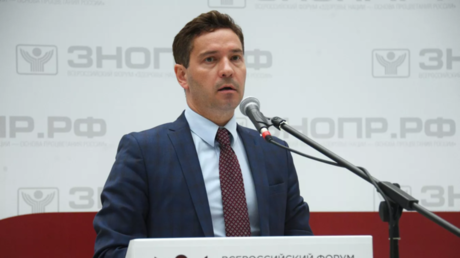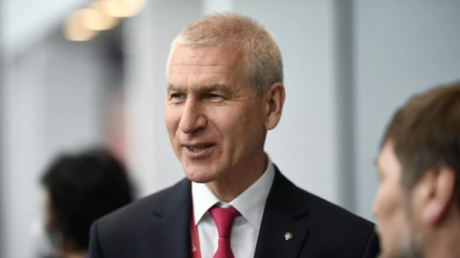
‘The dynamics are different, everything changes quickly’ – ex-Spartak defender on Games of the Future phygital football


The level of competition in phygital football tournaments has increased, and the game’s dynamics in the physical aspect do not allow for a moment of relaxation, as Alexander Sheshukov said in an interview with RT, after finishing fourth as part of the Phoenix team at the Games of the Future. The former Spartak defender also shared his experience of working with Guillermo Abascal, discussed which team he will join in the Media League, and commented on Alexander Ovechkin’s pursuit of Wayne Gretzky’s record.
– What impressed you the most about the organization of the Games of the Future?
– Definitely the scale of the event. I came to Kazan a year ago for the qualifying tournament, and there were fewer teams back then. Now, there are 16. Moreover, the opening ceremony was attended by heads of many states. Overall, the organization is at a high level.
– Roman Shishkin mentioned that your team, Phoenix, is very balanced. Did you participate in player selection?
– Last year, I met Roman and we talked about it. And I agreed to participate. Initially, we had only two esports players, Nikolay Brenyov and Pavel Skuratov. To bolster the digital part, they invited their friend, Maxim Kazankov. Compared to last year, we gained one esports player, and we still have five footballers.
– How is your experience with esports going?
– I can play, but the outcome remains uncertain. Maxim has been training purposefully for the past couple of months, while I haven’t had such an opportunity.
 ‘New Era’: Russia reasserts its role as a leader in global sports with Games of the Future success
‘New Era’: Russia reasserts its role as a leader in global sports with Games of the Future success
– How good are you with a gamepad?
– I can handle it. However, there are nuances when it comes to four-a-side football, such as the arena is walled and other things that require attention and training. Normally, my son and I prefer to play the classic version, with 11 players in each team. That format would be easier for me.
– Do your children help you stay updated on novelties and trends in the world of esports?
– My daughter is only six years old, so she does not follow it yet. However, my son is older, turning 18 this year. We play together, or I play with my brother.
– In the team, do you focus more on the virtual or physical aspect?
– There is no division between the two. The more advantage we have secured at the virtual stage, the easier it is for us on the field later. Our emphasis is on creating that lead. We have gathered a group of top guys. Maxim has been training for a long time. When we step onto the field with a three or four-goal cushion, it becomes a lot easier to play. This format consists of two halves of five minutes each, and the opponent needs to catch up, taking more risks. Meanwhile, we can focus on maintaining the score and even bring in the goalkeeper who excels with his feet. It becomes a tremendous advantage, allowing us to conserve energy for the next stage.
– You only played in the playoffs...
– Yes, during the group stage, I wore the uniform but decided not to risk going onto the field. I needed time to recover from a minor injury and didn’t want to exert myself for a few days. It was agreed with the team from the start that I would step in to help during the playoffs. Unfortunately, it turned out to be a mere formality. We lost both decisive matches, and it was disappointing.
– Initially, many perceived the Games of the Future as entertainment for children. Do you think the attitude has changed during the tournament?
– My perspective remained the same. We were aware that serious opponents would participate. We have something to compare it to. Over the year, teams have significantly improved in the physical aspect. If, during the selection process, some teams seemed unconvincing on the field, that is no longer the case.
All teams are on equal footing, and the competition is intense on the field. Even with a lead of several goals, one must go all out, let alone if the score is equal or you’re already losing… Goals can be scored or conceded on the small field in a matter of minutes. The dynamics are indeed different in this new format, and that’s what sets it apart most of all.
– Are the dynamics similar to mini-football?
– Well, the goals are bigger, so if you have an accurate kick, you can try shooting from the center of the field.
– It seems like the format of the Media League suits you better.
– Let’s just say I’m more familiar with it.
– By the way, which team will you be playing for next season?
– I’ll be joining Fight Nights, where Roman Pavlyuchenko plays. I’m not sure if this has been announced yet, but we’ve discussed the details. I’ve already been added to their group chat on one of the messengers. I’ll be helping the team this season.
– What’s your take on the Media League in general?
– If we look back at the first seasons, it was more entertainment-focused, and the level of football wasn’t very high. I don’t want to offend anyone, but it was primarily about having fun. However, with each season, the level of teams has risen. The top five or six teams in the Media League now are very strong and could compete with clubs from the Second League. This is evident from the matches in the country’s cup.
Now they have training camps, daily training sessions, and qualified coaches. It’s no longer just a group of guys kicking a ball around. After matches, they analyze the games. It’s gradually moving towards professional football. The attendance also exceeds that of the Second Division. Last year, we went to Nizhny Novgorod for a match against Sakhalinets, and 12,000 to 14,000 people came to the stands. It’s challenging for lower divisions to achieve such numbers now.
– Even Russian Premier League (RPL) matches don’t always attract as many spectators today.
– We definitely need to attract young people to the stands. And I believe the Media League has a future because this trend is also growing internationally. I’ve heard of a similar tournament in Spain where teams of former football stars play to packed stadiums in the finals. I believe, after some time, international matches can be held here as well. Why not? This will only boost enthusiasm. The main thing is to get people more involved in sports, to get them out of their homes and into the stands to support their favorite teams.
– Apart from the Media League, what else do you do?
– I’ve been working as an assistant at Rodina-2 for several years now. Currently, we’re in the golden group. I want to take this opportunity to thank the club, as well as the sports director Alexey Zinin and our head coach Alexander Laktionov, for allowing me to participate in other tournaments. The team had a training camp in Turkey, but I missed the first game in Chelyabinsk because of the third-place match at the Games of the Future. By the way, I also got a category B coaching license while working at Rodina-2, now I need to study for A.
– And then maybe you can move up to the Pro level and coach an RPL club.
– Well, that’s still far off. It takes time and effort to reach that level.
– Do you follow Spartak’s results?
– Of course, I do. I watch their matches when I have time. After all, Spartak is a special team for me. I didn’t play for Lokomotiv as much, plus I had an injury. Generally, the fans who recognize me on the street are Spartak fans.
– Do you think Spartak has a realistic chance of competing for the gold?
– The gap to first place is eight points. But Spartak has managed to level the score even in worse situations in the past. It depends on how they train during the offseason and how they start the second half of the championship. If they win two or three consecutive matches after the draw in Saint Petersburg, it will liberate them psychologically and boost their confidence. It’s hard to make predictions though. For that you’d need a better understanding of what’s happening and of the players’ form, a perspective from the inside.
– How has Spartak changed since Guillermo Abascal arrived?
– It’s hard to say. There are periods when they play very well, but also times when they perform poorly.
Perhaps, they sometimes achieve results due to their class and experience, but Spartak hasn’t shown cohesive play since winning the championship in 2017. Back then, the Moscow club won because the guys played as a united team, salvaging many matches in the last minutes. They also played very attractive football. I think that’s the level of stability they should strive for.
– Should a team like Spartak be led by a Russian coach or a foreigner?
– I believe that nationality shouldn’t be the deciding factor. It’s more important to consider the coach’s level of expertise and the style of play they implement. That’s what truly matters.
– Which coach throughout your career was closest to you in spirit, and with whom would you like to continue working?
– I was lucky in that regard: I took a little from each coach, and I was comfortable working with all of them. I probably crossed paths the most with Miodrag Bozovic. At Moscow, Rostov, and also Lokomotiv. Talking of the RPL, it’s probably him. In my opinion, he’s a robust professional and a wonderful person. He’s more of a coach-psychologist.
– Why do you think Georgy Dzhikiya ended up on the bench at Spartak?
– I’m not on the team, so it’s hard to say. You need to see the defender at training sessions. Perhaps some disagreements arose around his performance. Such things can happen in any team. Let’s say the coach sees that a footballer is not playing to his standard, while the player believes the opposite. This can lead to misunderstandings or even serious disagreements. But this is just an example, not necessarily related to Dzhikiya.
– The KHL playoffs have started. Do you follow the competitions?
– Yes. I’m rooting for Avangard.
– Why not Spartak?
– Well, I’m from Omsk, I grew up going to their arena. In ice hockey, I’ve never supported another team — only Avangard.
– Do you think the Omsk team is up to the task of winning the Gagarin Cup this season?
– In the Eastern and the Western Conferences, there are three or four teams that are capable of winning. Some may have more squad depth. And this will be crucial over the long haul because injuries happen. I think the most even and balanced team in all lines, with roughly equal fives, will be the winner. And of course, as a fan, I hope Avangard makes it to the finals.
– Do you communicate with the guys from the team?
– No, I don’t know anyone. I left Omsk a long time ago. I’ve been to the new arena twice. And every time, when I’m in the stands, Avangard loses! Apparently, I’m a kind of a jinx for them (laughs).
– What are your impressions of the new Avangard stadium?
– The arena is just awesome! I’ve been to matches involving Florida and the Rangers in the US, so I have something to compare it to. The new Avangard arena is in no way inferior, as well as the old SKA arena, which I also visited.
– Who do you root for in the NHL?
– I don’t have a favorite club. In my youth, many followed Detroit; their clashes with New Jersey and Colorado are memorable. And now, of course, Washington — because of Alexander Ovechkin. We cheer for him and hope he beats Wayne Gretzky’s record.
– Can he do it?
– I think so. If he stays in good shape, he can do it over two seasons, if not earlier. In two years, he’ll be 40, and there are hockey players who played even longer.
– Yes, Joe Thornton played until he was 45.
– The main thing is to avoid injuries. Then Ovechkin can score 20-25 goals per season. Especially since there are still plenty of games left in this regular season.
– Some believe that the chase after Gretzky’s record has become a commercial story and is dragging down the Washington Capitals.
– I doubt it can be a hindrance to the team. But there’s probably some commercial aspect to it. This record stood for so many years, and no one could even come close to it. And now there’s such a chance. Especially for our compatriot, who has been playing for the Capitals for so many years. And I sincerely wish for him to achieve his goal.


